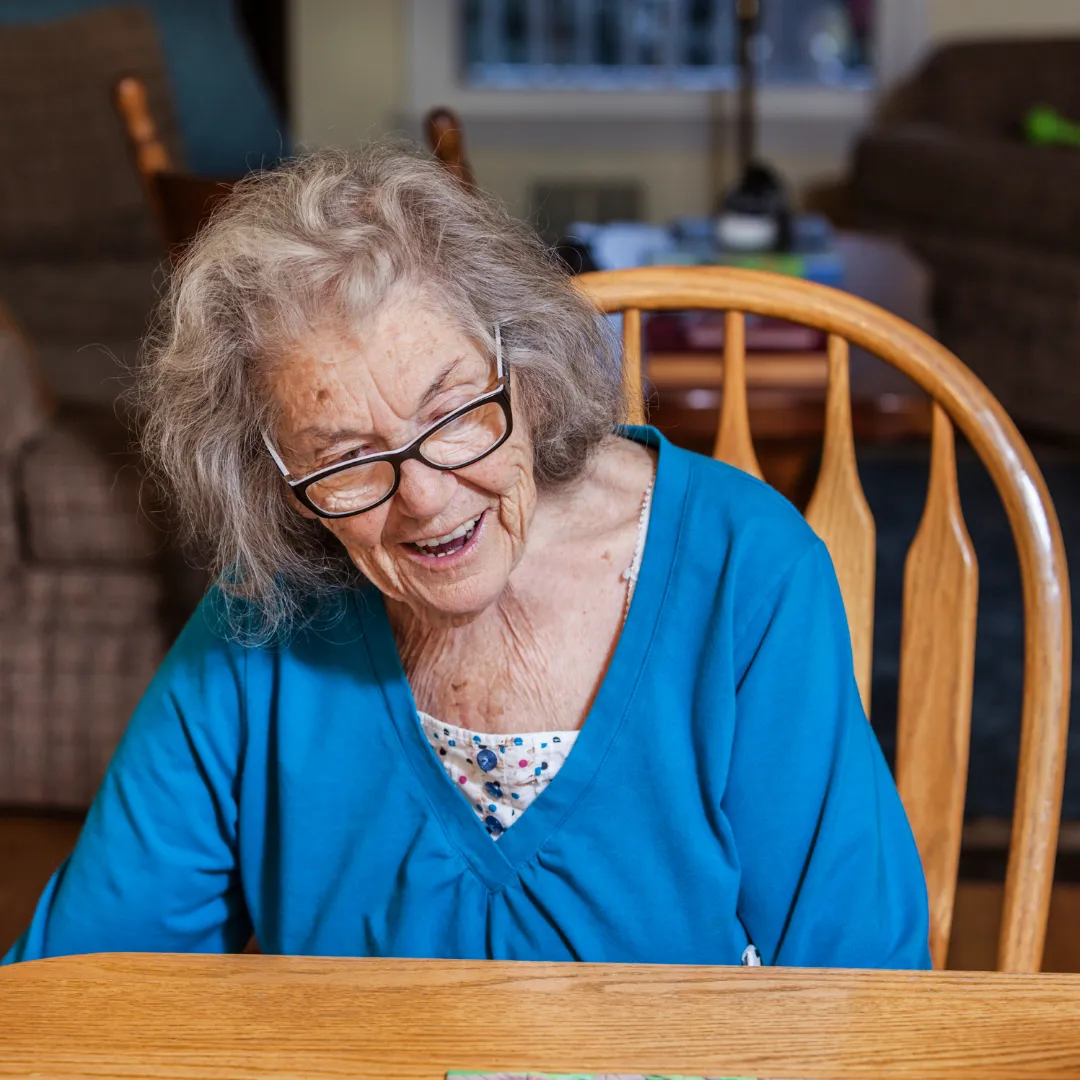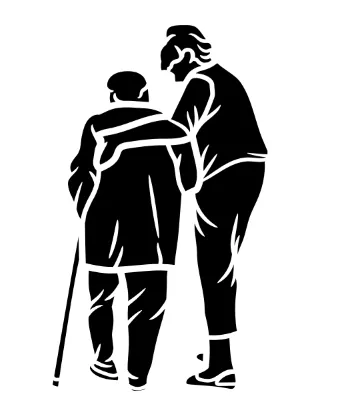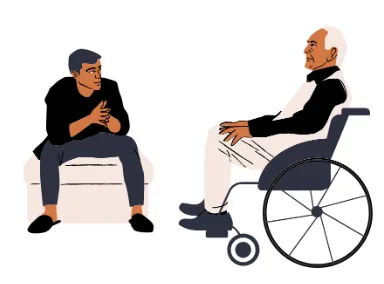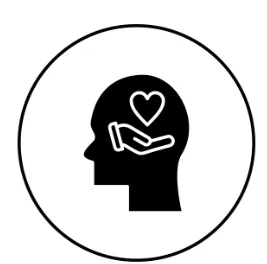Visit us: Mon - Fri: 9:00 - 18:30
Braley Care Homes 6192 US 60 Hurricane, WV 25526
Dementia Care: Compassionate Support at Braley Care Homes
Understanding Dementia: What It Is

Dementia is a broad term that represents a progressive neurological condition affecting a person's ability to think, remember, and communicate. This decline in cognitive function goes beyond the normal aging process and can significantly impact daily life and independence. Dementia care, a specialized care field, aims to help individuals with dementia maintain their quality of life and as much independence as possible. It focuses on creating a safe and supportive environment and may involve reminders for daily tasks, meal preparation assistance, and bathing and dressing support.
According to the World Health Organization, approximately 50 million people live with dementia worldwide, and this number is expected to triple by 2050. In the United States alone, around 5.8 million people are living with Alzheimer's disease, the most common form of dementia.
Dementia is more than a single disease; it's a term that encapsulates a group of related symptoms associated with an ongoing decline in cognitive function. These symptoms go beyond the normal age-related changes and significantly affect a person's ability to perform everyday tasks.
Causes and Risk Factors for Dementia
When brain cells are damaged, they can no longer send messages to each other like they used to - and this communication breakdown is what causes dementia. From memory retention and judgment skills right down to movement control, every part of the brain has an important job; when those neurons get disrupted it's much more than just a little forgetful moment. While most changes in the brain that cause dementia are permanent and worsen over time, thinking and memory problems caused by the following conditions may improve when the condition is treated or addressed:

Depression.

Medication
side effects.

Excess use of alcohol.

Thyroid problems.

Vitamin deficiencies.
Understanding Memory Care
At present, a lot of assisted living centers have memory care centers operating within their facilities. However, assisted living and memory care are very different in the services they provide.
Memory care involves a more comprehensive form of elderly care as it is solely dedicated to people living with dementia, Alzheimer’s, and any other forms of memory impairment. Memory care centers are usually easy to navigate through on the chance that a patient manages to wander off but they also have staff members round the clock to provide supervision on the probability that it actually happens.
Dementia patients in the early to intermediate stages usually spend a bit of time in assisted living institutions because they are allowed to be somewhat independent and their health and safety are catered for. The rooms they stay in are private and the staff is not available 24/7 apart from emergency care staff.
Nursing homes accommodate patients with dementia who are at the later stages of their disease when they are not able to walk, talk, or eat by themselves.
Benefits Provided by Memory Care Centers
Of all forms of senior care, memory care has grown increasingly rapid and with good reason too. Memory care services are more specific as compared to assisted living as it is better poised to offer high value to a patient dealing with Alzheimer’s or dementia. Some of these benefits include less violent episodes, increased social interactions, fewer falls or injuries, reduced visits to the emergency room, or decreased need for medications.
On top of the fact that memory care centers are responsible for keeping seniors safe and promoting their physical and mental conditions, they provide patients with care services that are structured to decrease their loss of memory. These services range from basic treatments to patient-curated services designed by industry professionals who have specialized in managing dementia.
Benefits Provided by
Memory Care Centers
Of all forms of senior care, memory care has grown increasingly rapid and with good reason too. Memory care services are more specific as compared to assisted living as it is better poised to offer high value to a patient dealing with Alzheimer’s or dementia. Some of these benefits include less violent episodes, increased social interactions, fewer falls or injuries, reduced visits to the emergency room, or decreased need for medications.
On top of the fact that memory care centers are responsible for keeping seniors safe and promoting their physical and mental conditions, they provide patients with care services that are structured to decrease their loss of memory. These services range from basic treatments to patient-curated services designed by industry professionals who have specialized in managing dementia.
Understanding Memory Care
At present, a lot of assisted living centers have memory care centers operating within their facilities. However, assisted living and memory care are very different in the services they provide.
Memory care involves a more comprehensive form of elderly care as it is solely dedicated to people living with dementia, Alzheimer’s, and any other forms of memory impairment. Memory care centers are usually easy to navigate through on the chance that a patient manages to wander off but they also have staff members round the clock to provide supervision on the probability that it actually happens.
Dementia patients in the early to intermediate stages usually spend a bit of time in assisted living institutions because they are allowed to be somewhat independent and their health and safety are catered for. The rooms they stay in are private and the staff is not available 24/7 apart from emergency care staff.
Nursing homes accommodate patients with dementia who are at the later stages of their disease when they are not able to walk, talk, or eat by themselves.
Benefits Provided by Memory Care Centers
Of all forms of senior care, memory care has grown increasingly rapid and with good reason too. Memory care services are more specific as compared to assisted living as it is better poised to offer high value to a patient dealing with Alzheimer’s or dementia. Some of these benefits include less violent episodes, increased social interactions, fewer falls or injuries, reduced visits to the emergency room, or decreased need for medications.
On top of the fact that memory care centers are responsible for keeping seniors safe and promoting their physical and mental conditions, they provide patients with care services that are structured to decrease their loss of memory. These services range from basic treatments to patient-curated services designed by industry professionals who have specialized in managing dementia.
When You Should Consider Choosing Memory Care
There are certain activities that can reduce the development of dementia and these are services you will not usually find in a nursing home. For example, scientific study has shown that doing an outdoors walk at regular times of the day can help people struggling with dementia apart from the straightforward benefits of exercise. You’ll find that a nursing home might not be so open to that idea.
Music, which is usually found in all residential living rooms for the elderly, might not be so welcome to people with dementia. Memory care staff will have to approach and speak to a patient gently before requesting to play them any music despite the fact that it has been found to offer therapeutic benefits to people with Alzheimer’s.
Perhaps the fact that staff members at a memory care unit are better trained in caring and responding to dementia-related issues such as wandering or hostilities from the patient. The chances you’ll find staff trained specifically to help people with dementia working in a nursing home are not as high as staff members working in a memory care unit.
Every state has set in place rules stipulating how staff must be trained and experience for a certain amount of time before they are deemed qualified to engage a patient with dementia. Memory care centers give more assurance on this issue as compared to nursing homes because the staffers are better skilled at patience when communicating with patients with dementia or calming them down so they can receive to be administered medicine on the chance that they become aggressive.
Memory care centers are also designed for people with dementia. Subtle things such as brightly decorated or painted walls or allowance of natural light are therapeutic aspects for people living with dementia.
Choosing whether to make a memory care facility for an elderly loved one is a tough choice. Make sure that you consider the cost, accreditation of the facility, its location, and the services it offers.
Music, which is usually found in all residential living rooms for the elderly, might not be so welcome to people with dementia. Memory care staff will have to approach and speak to a patient gently before requesting to play them any music despite the fact that it has been found to offer therapeutic benefits to people with Alzheimer’s.
Understanding the Nature of Dementia
The common misconception about dementia is that it is synonymous with Alzheimer's disease. While Alzheimer's is the most prevalent type of dementia, accounting for 60-80% of cases, dementia represents a broader category of brain diseases that impair memory, thinking, and speech.
Core Features of Dementia
Cognitive Decline:
Dementia affects memory, concentration, language, and reasoning, leading to challenges in daily living.
Progressive Nature:
The symptoms of dementia tend to worsen over time, affecting both the person's quality of life and their ability to function independently.
Emotional Impact:
Dementia may lead to changes in personality and mood, contributing to anxiety or depression.
Social Effects:
The ability to interact socially and maintain relationships may be compromised, leading to potential isolation.
Dementia Care
Specialized care for individuals with dementia, known as dementia care, aims to maintain their independence and quality of life. It emphasizes creating a supportive environment, respecting their dignity, and focusing on their unique needs. Dementia care may involve providing reminders for daily tasks, assisting with meal preparation, bathing, dressing, and engaging in stimulating activities.
According to the World Health Organization, there are approximately 50 million people living with dementia globally, and this number is expected to triple by 2050. In the United States, an estimated 5.8 million people are living with Alzheimer's disease alone.
Understanding dementia is crucial not only for those diagnosed but also for caregivers, family members, and society as a whole. Recognizing it as a progressive neurological condition that affects multiple areas of cognition helps in framing the right approach to care and support. With a growing global prevalence, dementia is not merely a medical concern but a social challenge that calls for empathy, awareness, and concerted action. Whether for a loved one or someone you are caring for, knowing what dementia entails is the first step towards providing compassionate and effective care.
Types of Dementia
Dementia is not a single disease but rather a term that encompasses various conditions affecting memory, thinking, and social abilities. The most well-known type is Alzheimer's disease, responsible for 60-80% of cases. Other types include vascular dementia, Lewy body dementia, and frontotemporal dementia. Each type of dementia may have unique characteristics, but they all share the primary trait of cognitive decline.
Dementia is a complex and multifaceted condition that can manifest in various forms. Understanding the different types of dementia is vital for appropriate diagnosis, treatment, and care.
Alzheimer's Disease
Alzheimer's is the most common type of dementia, affecting an estimated 60-80% of those diagnosed with dementia. It is characterized by memory loss, confusion, and difficulty in speaking, writing, and thinking. In the United States, an estimated 5.8 million people are living with Alzheimer's disease, the most prominent form of dementia.


Vascular Dementia
The second most common type of dementia, vascular dementia, is caused by reduced blood flow to the brain. It may result from a stroke or other conditions that damage blood vessels. Symptoms can vary widely but often include problems with reasoning, judgment, and memory.
Lewy Body Dementia
Lewy Body Dementia (LBD) is associated with abnormal protein deposits in the brain. These deposits lead to issues with thinking, behavior, and movement. Symptoms might include visual hallucinations and a parkinsonian tremor.


Frontotemporal Dementia
This type of dementia impacts the frontal and temporal lobes of the brain, affecting personality, behavior, and language. Frontotemporal dementia is often diagnosed at a younger age than other dementias.
Mixed Dementia
A diagnosis of mixed dementia means that more than one type of dementia is present. For example, a person might have both Alzheimer's disease and vascular dementia.


Rarer Types
There are many other less common types of dementia, including Parkinson's disease dementia, Huntington's disease, and Creutzfeldt-Jakob disease. Each has unique characteristics and challenges.
Tailoring Care to the Type
Understanding the specific type of dementia is critical for patient care, as different types require different approaches. Dementia care, specialized for the individual's needs, should consider the unique characteristics and progression of the specific type of dementia. This tailored approach helps in maintaining the person's independence, dignity, and quality of life.
Different types of dementia present different symptoms and challenges, requiring specific responses and interventions. By understanding these variations, healthcare providers, caregivers, and family members can offer more targeted and effective care. Knowledge of the types of dementia aids not only in diagnosis and treatment but also in empathy and support, essential components in managing this complex condition.
Signs and Symptoms of Dementia
The symptoms of dementia vary depending on the type and stage of the condition. Common signs include memory loss, confusion, changes in mood or behavior, difficulty in communicating, and challenges in performing daily activities. Early diagnosis and intervention can lead to more effective management of these symptoms, enhancing the individual's quality of life.
Dementia is not a single disease but a collection of symptoms that affect memory, thinking, and social abilities. These symptoms can interfere with daily functioning and independence. Understanding the signs and symptoms of dementia is crucial for early intervention, which can slow progression and improve quality of life. Here's a look at some common and key indicators:

Memory Loss
The most well-known symptom, memory loss, particularly affects short-term memory. Forgetting recent conversations or repeating questions frequently are typical signs.

Difficulty with Communication
Struggling to find the right words, repeating oneself, and difficulty following or joining a conversation can be indicators of dementia.

Changes in Mood or Personality
Dementia can lead to shifts in mood or personality, such as increased irritability, depression, or anxiety. A person might become more withdrawn or show less interest in social activities.

Difficulty with Problem-Solving or Complex Tasks
Tasks that require organization or planning can become challenging. Managing finances, following a recipe, or keeping track of monthly bills may become unmanageable.

Confusion and Disorientation
People with dementia may become confused about time or place, forgetting where they are or how they got there. This confusion can lead to fear or anxiety.

Coordination and Motor Function
Dementia can affect physical coordination, leading to difficulty with balance or walking. It might also impact fine motor skills like writing or buttoning a shirt.

Changes in Behavior
Uncharacteristic behaviors such as aggression, agitation, or inappropriate comments may arise. These behavioral changes can be challenging for family members and caregivers to handle.

Visual and Spatial Difficulties
Difficulty interpreting visual information, such as judging distances or differentiating between colors, can be a sign of certain types of dementia, like Lewy Body Dementia.

Social Withdrawal
A person with dementia might withdraw from hobbies or social activities they once enjoyed. This withdrawal is often a reaction to the challenges they're experiencing rather than a loss of interest in these activities.
Consideration for Care
Recognizing these signs and symptoms is essential for timely diagnosis and treatment. If you notice these in yourself or a loved one, it's wise to consult a healthcare provider for a proper evaluation. Early intervention can provide the best chance to manage symptoms and maintain quality of life.
Each person's experience with dementia can vary significantly, reflecting the complexity of the condition. Specialized dementia care, which respects the dignity and autonomy of the individual, can make a significant difference in managing these symptoms and enhancing the person's well-being.
An integrated approach to dementia care, focusing on both medical treatment and lifestyle adjustments, can assist in navigating the unique challenges of this condition. Family, caregivers, and healthcare professionals play vital roles in providing support, information, and empathy to those living with dementia.
Diagnosing Dementia
Diagnosis of dementia involves a thorough medical examination, including physical and neurological assessments, blood tests, and imaging studies. A detailed history from family members and caregivers can provide essential information to support diagnosis. Although dementia cannot be completely cured, an early and accurate diagnosis allows for timely treatment and support.
Diagnosing dementia is a complex process that involves thorough examination and assessment by healthcare professionals. It's not just about identifying the symptoms but understanding their causes and determining the most appropriate care and treatment. Here's an overview of how dementia is typically diagnosed:
Initial Evaluation
The process often begins with a primary care physician or family doctor, who conducts a preliminary assessment. This evaluation includes a detailed review of medical history, current symptoms, and possibly some initial cognitive tests.
Comprehensive Medical Examination
Physical examination and laboratory tests help rule out other conditions that could be causing symptoms. This includes checking for thyroid problems, vitamin deficiencies, or other underlying health issues that might be contributing to cognitive problems.
Neurological Assessment
A neurologist may be involved to assess memory, language, problem-solving, and other cognitive functions. This examination also includes evaluating reflexes, coordination, eye movement, and other aspects of the nervous system.
Cognitive and Neuropsychological Testing
These tests gauge memory, problem-solving, attention, language, and other intellectual functions. They are conducted by trained professionals and can be extensive, providing a detailed picture of a person's cognitive abilities and areas of impairment.
Imaging Studies
Brain scans such as a CT scan or MRI can detect changes in the brain's structure, such as shrinking of certain areas or abnormal deposits. These images help in diagnosing specific types of dementia, such as Alzheimer's disease or vascular dementia.
Psychiatric Evaluation
Since dementia symptoms can be similar to those of depression, anxiety, or other mental health conditions, a psychiatric evaluation can help distinguish between these disorders.
Family Input
Family members or close friends may be asked to provide information about changes they've noticed. Their insights can be invaluable in creating a full picture of the situation, especially in understanding daily functioning and behavior changes.
Ongoing Observation and Assessment
Diagnosing dementia often requires ongoing observation and regular follow-up assessments. Dementia's progression may reveal more specific symptoms over time, leading to a more precise diagnosis.
Diagnosing Specific Types of Dementia
There are various types of dementia, including Alzheimer's disease, Lewy Body Dementia, vascular dementia, and more. Each has specific characteristics, and identifying the particular type helps tailor treatment and care to individual needs.
Diagnosing dementia is a multifaceted process that takes time, expertise, and compassion. Early and accurate diagnosis provides the best opportunity for appropriate treatment, support, and planning, allowing individuals and families to make informed decisions about care.
Given that dementia is a progressive neurological condition affecting a person's ability to think, remember, and communicate, specialized care tailored to individual needs is vital. As of 2019, the cost of dementia care in the United States was estimated at $305 billion, including $144 billion in unpaid care by family and friends (Alzheimer’s Association). Therefore, appropriate diagnosis and management are not only essential for the quality of life of the individual but also have substantial financial considerations.
The process of diagnosing dementia requires collaboration among various healthcare professionals, family members, and caregivers, all working together to ensure that care respects the dignity and autonomy of the individual. It emphasizes the importance of a comprehensive, empathetic approach to managing this complex and challenging condition.
Managing Dementia
Managing dementia involves a person-centered approach that considers the individual's unique needs and preferences. Activities such as music, art, or other hobbies can stimulate the mind, while nutritious meals, exercise, and maintaining a regular routine contribute to overall well-being. Experts, family members, and caregivers all play a role in the care team, providing emotional support and managing behaviors associated with dementia.
Managing dementia requires a comprehensive approach that addresses not only the medical aspects of the disease but also the psychological, social, and environmental factors that can affect an individual's well-being. Here's how different aspects of dementia are managed:
Medical Management
Medications may be prescribed to help with cognitive symptoms or to manage concurrent conditions like depression or anxiety. While there's no cure for dementia, some medications can help slow down the progression of symptoms or manage specific problems such as sleep disorders or agitation.
Cognitive Therapies
Therapies such as cognitive-behavioral therapy (CBT) or occupational therapy can be effective in helping individuals with dementia to maintain their cognitive abilities. Activities and exercises are designed to stimulate the mind, focusing on memory, reasoning, and communication skills.
Personalized Care Plans
Dementia care should be tailored to the individual’s specific needs, respecting their dignity and autonomy. Care plans are designed to support independence, taking into consideration the unique preferences, hobbies, and routines of the person with dementia.
Environmental Modifications
Creating a safe and supportive environment is essential. This can include adapting the home to minimize confusion, such as clear labeling, good lighting, and removing potential hazards. Familiar objects and photographs can provide comfort and help with orientation.
Nutritional Support
Dietary needs must be carefully managed. This involves providing nutritious meals that cater to individual preferences and any chewing or swallowing difficulties that may be present.
Physical Activity
Regular physical exercise, such as walking, dancing, or gardening, helps maintain mobility and can positively impact cognitive functioning.
\Emotional and Social Support
Providing emotional support and opportunities for social interaction is vital in reducing feelings of isolation and depression. Engaging in group activities, family gatherings, or simple one-on-one conversations can make a significant difference.
Family and Caregiver Involvement
The support of family members and caregivers is invaluable in managing dementia. Their involvement includes not only practical assistance but also emotional encouragement, understanding, and companionship. Training and resources for caregivers can be vital in helping them provide effective care.
Professional Care Services
Professional care services may include home care, respite care, or assisted living facilities, depending on the level of need. These services provide specialized care for individuals with dementia, with trained staff to handle specific challenges and requirements.
Regular Assessments and Monitoring
The progression of dementia necessitates regular assessments and monitoring. Ongoing evaluation ensures that the care and support being provided continue to meet the evolving needs of the individual.
Managing dementia is a complex and ongoing process that involves a collaboration between healthcare professionals, family members, and caregivers. The emphasis on individualized care, safety, mental stimulation, physical well-being, emotional support, and quality of life reflects a holistic approach that recognizes the multifaceted nature of dementia.
With an estimated 5.8 million people in the United States living with Alzheimer's disease, the most common form of dementia, and a cost of $305 billion in 2019, the importance of effective management cannot be overstated (Alzheimer’s Association). It underscores the necessity for a compassionate, integrated approach that adapts to the unique needs and challenges faced by each individual living with dementia.
Treatment Options for Dementia

Treatment for dementia varies depending on the type and symptoms. Medications, cognitive therapies, and lifestyle changes are common methods of managing the disease. These treatments aim to slow progression, alleviate symptoms, and enhance the individual's quality of life.
Dementia, a progressive neurological condition, can have a profound impact on a person's ability to think, remember, and communicate. Treatment for dementia is multifaceted and should be individualized to meet the needs and preferences of the person affected. Here's an overview of the various treatment options available for dementia:
Medications
Several medications are available to help manage symptoms of dementia, particularly Alzheimer's disease. Some of these drugs aim to improve cognitive functions, while others may be prescribed to treat mood swings, depression, or sleep problems. While no cure exists for dementia, medications can sometimes slow the progression of symptoms.
Non-Pharmacological Therapies
These include various therapies aimed at maintaining or improving a person’s cognitive, emotional, and physical well-being:
Cognitive Stimulation Therapy: Engages individuals in mentally stimulating activities to help maintain cognitive abilities.
Occupational Therapy: Helps individuals with daily living activities and promotes independence.
Music Therapy: Can enhance mood and stimulate memories through familiar melodies and rhythms.
Art Therapy: Encourages self-expression and may improve mood and self-esteem.
Lifestyle Changes
Nutrition: Eating a balanced diet rich in nutrients supports overall health and well-being. Special considerations may be needed for individuals with chewing or swallowing difficulties.
Exercise: Regular physical activity supports cardiovascular health and may improve cognitive function. Tailored exercise programs can be designed to suit an individual's needs and abilities.
Stress Reduction: Techniques such as mindfulness or relaxation exercises can alleviate stress and anxiety.
Personalized Care Plans
Tailoring care to an individual's needs and preferences is essential for optimizing quality of life. This includes respecting the person's dignity, providing emotional support, and offering activities that align with their interests and abilities.
Assistive Technology
Technological devices such as reminders, alarms, or communication aids can be helpful in supporting daily living activities and maintaining independence.
Residential Care
Some individuals may benefit from specialized residential care facilities that provide a safe environment and cater to the unique needs of people with dementia. This includes nursing homes, assisted living facilities, or dementia-specific care units.
Support for Caregivers
Caregivers play a crucial role in the treatment and support of individuals with dementia. Access to resources, education, and support groups can empower caregivers to provide effective care while taking care of their well-being.
Palliative and End-of-Life Care
For individuals in advanced stages of dementia, palliative care focuses on comfort, pain management, and preserving the quality of life. Discussions around end-of-life preferences should be initiated early to honor the person's wishes.
The treatment for dementia is not a one-size-fits-all approach. The emphasis on individualized care, integration of medical and non-medical interventions, and collaboration between healthcare providers, caregivers, and families reflect a comprehensive and compassionate approach to care. With an estimated 50 million people living with dementia worldwide, and this number expected to triple by 2050 (World Health Organization), the need for thoughtful and responsive treatment is more pressing than ever.
Coping Strategies for Caregivers
Caring for someone with dementia can be emotionally and physically taxing. Support groups, respite care, and other resources can offer vital assistance for caregivers. Educating oneself about the disease, creating a supportive home environment, and seeking professional guidance can ease the caregiving journey.
Caring for a loved one with dementia is a complex and emotionally taxing journey. Caregivers often face unique challenges, including managing difficult behaviors, juggling multiple responsibilities, and dealing with emotional strain. In the United States, an estimated 15.7 million families and friends provided 18.2 billion hours of unpaid care to those with Alzheimer’s and other dementias in 2019 (Alzheimer’s Association). Here's a look at coping strategies that can support caregivers in this vital role:

Education and Information
Understanding the nature of dementia, its progression, and common symptoms can equip caregivers with the knowledge they need to provide effective care. Various organizations and healthcare professionals offer education, support, and resources tailored to caregivers.

Support Networks
Building a support network with family members, friends, or joining support groups can help alleviate feelings of isolation. Connecting with others who share similar experiences can provide emotional comfort and practical advice.

Respite Care
Taking breaks is essential for the well-being of caregivers. Respite care services provide temporary relief by taking over caregiving responsibilities, allowing the primary caregiver some time to rest and recharge.

Communication Techniques
Effective communication with a person living with dementia requires patience and empathy. Simple language, visual aids, gentle touch, and maintaining eye contact can facilitate better understanding and connection.

Behavior Management
Identifying triggers and patterns in behaviors can help caregivers develop strategies to prevent or manage challenging situations. Flexibility, creativity, and a calm demeanor are crucial in handling unexpected behaviors.

Professional Assistance
Seeking professional help from medical experts, occupational therapists, or professional caregivers can provide additional support, guidance, and specialized care tailored to the needs of the person with dementia.

Legal and Financial Planning
Consulting with legal and financial professionals early in the diagnosis can assist in planning for future care needs, protecting assets, and ensuring that the legal wishes of the individual with dementia are honored.

Focus on Self-Care
Caregivers must prioritize their mental and physical health. Regular exercise, proper nutrition, sufficient sleep, and engaging in hobbies or activities that bring joy are vital for maintaining balance and resilience.

Develop a Care Plan
A well-thought-out care plan that includes daily routines, medical information, emergency contacts, and preferences of the individual with dementia can streamline caregiving tasks and ensure consistent care.

Utilize Technology
Various assistive technologies and apps are available to aid in medication reminders, tracking symptoms, and staying organized, making the caregiving process more manageable.

Recognize and Seek Help for Caregiver Burnout
Caregiver burnout is a real and serious issue. Recognizing signs of exhaustion, depression, or overwhelming stress and seeking professional help when needed is paramount to the caregiver’s health and the quality of care they provide.
Coping with the demands of dementia care is a multifaceted challenge that often requires the integration of various strategies. Acknowledging the importance of dementia care, and the value of over 18 billion hours of unpaid care provided by family and friends, highlights the need for comprehensive support and resources. By implementing these coping strategies, caregivers can cultivate a compassionate and effective approach to dementia care, enriching the lives of their loved ones while preserving their well-being.
Nutrition and Exercise for Dementia Patients
Proper nutrition and regular exercise can significantly impact the overall health and well-being of a person with dementia. Tailored diets can help in maintaining cognitive function, while activities like walking provide physical benefits and mental stimulation.The role of nutrition and exercise in dementia care cannot be understated. Both these elements play a vital role in maintaining the physical health and cognitive functioning of individuals with dementia, enhancing their overall quality of life. Here's a closer look at how a balanced diet and regular physical activity can benefit dementia patients.
Nutrition
Balanced Diet
Providing a nutritious, well-balanced diet helps maintain the body's energy levels, supports immune function, and can positively influence cognitive health. This includes a variety of fruits, vegetables, whole grains, lean proteins, and healthy fats.
Specialized Nutritional Needs
Individuals with dementia may have specific nutritional needs or preferences. Tailoring meals to these needs, while ensuring nutritional balance, is essential.
Mealtime Assistance
Assistance in meal preparation, serving appropriate portion sizes, and offering aid during mealtimes may be necessary. Utilizing adaptive utensils can also make eating easier.
Hydration
Regular monitoring of fluid intake ensures that dehydration, which can exacerbate confusion and other symptoms, is avoided.
Addressing Eating Challenges
Dementia may cause difficulties in chewing, swallowing, or recognizing food. Collaborating with healthcare providers to understand and manage these challenges is vital.
Exercise
Personalized Exercise Plans
Developing an individualized exercise plan that suits the patient's interests and physical abilities can improve compliance and enjoyment. Activities might include walking, stretching, dancing, or simple seated exercises.
Cognitive and Physical Benefits
Regular physical activity has been shown to have a positive effect on cognitive functioning in people with dementia. It helps improve mood, sleep, and overall well-being.
Safety Considerations
Ensuring that exercise routines are safe and appropriate for the individual's fitness level is crucial. This might involve supervision or modification of exercises as needed.
Social Engagement Through Exercise
Group activities or exercising with a companion can provide social interaction, reducing feelings of isolation and promoting a sense of community.
Incorporating Daily Activities
Embedding exercise within daily routines, such as walking to the mailbox or gardening, makes it more natural and manageable.
Monitoring and Adapting
Regular assessment of the exercise routine ensures that it remains effective and enjoyable. Adjustments may be needed as the disease progresses or individual preferences change.
Nutrition and exercise play a part in addressing the complex needs of individuals with dementia, enhancing their quality of life. By focusing on these aspects, dementia care extends beyond medical interventions to encompass holistic well-being. Specialized care that considers the unique dietary requirements and physical capabilities of individuals with dementia creates a supportive environment that respects their dignity and autonomy. Ultimately, nurturing the physical body through proper nutrition and engaging in physical activity can have a profound impact on the mental and emotional well-being of someone living with dementia, offering ways to connect, thrive, and maintain a sense of self.
Safety Considerations for Dementia Patients

Dementia care must prioritize safety due to confusion and disorientation that can accompany the disease. Safety measures include clear pathways, proper lighting, secured hazardous materials, and regular supervision, ensuring a safe living environment.
Safety is a paramount concern in dementia care. As the disease progresses, cognitive impairments may lead to various risks around the home or care facility, such as confusion, falls, or accidents. Addressing these risks is essential in providing a safe and secure environment for someone with dementia. Here's an exploration of key safety considerations:
1. Home Safety Assessments :
Conducting regular assessments to identify potential hazards can prevent accidents. Look for trip hazards, unsecured rugs, sharp objects, and clutter that may pose risks.
2. Fall Prevention :
Installing grab bars, improving lighting, using non-slip mats, and removing obstacles can reduce the risk of falls.
3. Medication Management:
Proper storage and dispensation of medications prevent accidental overdose or missed doses. Consider using medication dispensers or alarms to keep track.
4. Emergency Response Systems:
Having systems in place for immediate response during an emergency, such as medical alert systems, can be lifesaving.
5. Wandering Prevention :
Secure locks, alarms, or GPS devices can be used to manage wandering tendencies, providing peace of mind for caregivers.
6. Fire and Burn Prevention :
Simple steps like installing smoke detectors, using stove guards, or lowering water heater temperatures can mitigate these risks.
7. Supervision and Monitoring :
Depending on the stage of dementia, constant or periodic supervision may be needed to ensure safety.
8. Transportation Safety :
Consideration should be given to whether or not it's safe for the individual to drive. Alternatives like arranged transportation or escort services might be necessary.
9. Personal Care Safety :
Assistance with bathing, grooming, and other personal care tasks should be provided with dignity and safety in mind.
10. Tailoring Safety Measures to Individual Needs :
Recognizing that each person with dementia has unique needs and preferences is essential in creating an effective safety plan.
11. Educating Family and Caregivers :
Education and support for those involved in the care process ensure that safety measures are understood and implemented consistently.
12. Involvement of Healthcare Professionals :
Regular consultation with healthcare professionals can provide expert insights into the specific safety needs of the individual.
By prioritizing safety and embedding thoughtful measures within the care approach, caregivers, family members, and healthcare professionals can create a protective environment that supports the autonomy and well-being of the individual with dementia. Safety considerations are an integral part of dementia care and require collaboration, attentiveness, and a deep understanding of the person's cognitive and physical abilities. This alignment ensures that people living with dementia are not only protected from harm but also feel secure and cared for in a space that recognizes and caters to their unique challenges and needs.
Financial Planning for Dementia Care
Dementia care costs in the United States were estimated to be $305 billion in 2019, highlighting the financial considerations in planning for care. Exploring various funding options, understanding Medicare and Medicaid benefits, and working with financial professionals can guide families in navigating the financial landscape of dementia care.
Dementia care represents a significant financial consideration for families and individuals affected by this progressive neurological condition. As the disease advances, so does the complexity and cost of care required, encompassing medical expenses, care facilities, home modifications, legal fees, and other related costs. Financial planning for dementia care is essential to ensure that resources are appropriately allocated, and quality care is accessible without undue strain on family finances. Here's a guide to understanding and navigating the financial landscape of dementia care:
1. Understanding the Costs:
Costs related to dementia care can be wide-ranging. They include medical treatments, medications, in-home care, adult day services, assisted living, or nursing home facilities. Understanding these costs is the first step in creating an effective financial plan.
2. Exploring Insurance Options :
Investigate insurance policies such as long-term care insurance, Medicare, or Medicaid. Coverage can vary widely, so it is crucial to understand what is and isn’t included.
3. Medication Management:
Proper storage and dispensation of medications prevent accidental overdose or missed doses. Consider using medication dispensers or alarms to keep track.
4. Emergency Response Systems:
Having systems in place for immediate response during an emergency, such as medical alert systems, can be lifesaving.
5. Wandering Prevention :
Secure locks, alarms, or GPS devices can be used to manage wandering tendencies, providing peace of mind for caregivers.
6. Fire and Burn Prevention :
Establishing legal documents such as power of attorney, health care proxy, and a living will is essential for addressing future financial and healthcare decisions.
7. Exploring Community Resources :
Many local communities offer resources such as respite care, support groups, meal delivery, and transportation services, often at low or no cost.
8. Evaluating Asset Management :
Considering how to best utilize existing assets, including property, investments, and savings, can be a vital aspect of financial planning.
9. Assessing Work-Related Benefits :
If the individual with dementia or their caregiver is still working, exploring work-related benefits, such as employee assistance programs, might be beneficial.
10. Creating a Budget :
Developing a comprehensive budget that accounts for current and future expenses will help in managing finances effectively.
11. Addressing Family Communication :
Open communication with family members about financial planning can prevent misunderstandings and foster collaborative decision-making.
Financial planning for dementia care is complex and multifaceted. The task involves not only understanding the financial requirements of caregiving but also aligning them with available resources and legal considerations. Early planning, consultation with experts, and a proactive approach can significantly ease the financial burden and ensure that both the individual with dementia and their caregivers are well-supported throughout the disease's progression.
With an estimated cost of $305 billion in the United States in 2019 for dementia care, and the prediction of a tripling of dementia cases worldwide by 2050, financial planning for dementia care is an urgent and growing concern. Thoughtful financial planning ensures that the person living with dementia receives the care they need without sacrificing quality or causing undue financial stress.
Dementia is a complex, multifaceted condition that affects millions of people around the world. From understanding its various types and symptoms to diagnosing and managing the disease, providing care for someone with dementia is an ongoing journey that requires expertise, compassion, and support. The challenges of dementia extend not only to those who suffer from the disease but also to their caregivers and families. They navigate a web of emotional, physical, and financial concerns, seeking to create a safe and nurturing environment while maintaining the dignity and quality of life of their loved one.
Braley Care Homes recognizes the complexity of dementia care and offers an integrated approach that combines professional expertise with personalized care. Our commitment to understanding the individual needs of each resident and our dedication to providing comprehensive support make Braley Care Homes a trusted partner in dementia care. Whether it's specialized treatment options, nutritious meals, engaging activities, or safety considerations, our dedicated team is here to support you every step of the way.
With the increasing prevalence of dementia and the staggering costs associated with care, it is crucial to make informed decisions that prioritize the well-being of the affected person without neglecting the needs of family and caregivers. At Braley Care Homes, we offer various options and resources to help you find the most appropriate care, tailored to your unique situation.
Are you seeking professional guidance, compassionate care, and a community that understands the challenges of dementia? Look no further than Braley Care Homes. Visit our website or give us a call today. Together, we can create a plan that empowers you and your loved one to face dementia with confidence, strength, and hope. Your journey doesn't have to be walked alone; Braley Care Homes is here to walk beside you.
When You Should Consider Choosing Memory Care
There are certain activities that can reduce the development of dementia and these are services you will not usually find in a nursing home. For example, scientific study has shown that doing an outdoors walk at regular times of the day can help people struggling with dementia apart from the straightforward benefits of exercise. You’ll find that a nursing home might not be so open to that idea.
Music, which is usually found in all residential living rooms for the elderly, might not be so welcome to people with dementia. Memory care staff will have to approach and speak to a patient gently before requesting to play them any music despite the fact that it has been found to offer therapeutic benefits to people with Alzheimer’s.
Perhaps the fact that staff members at a memory care unit are better trained in caring and responding to dementia-related issues such as wandering or hostilities from the patient. The chances you’ll find staff trained specifically to help people with dementia working in a nursing home are not as high as staff members working in a memory care unit.
Every state has set in place rules stipulating how staff must be trained and experience for a certain amount of time before they are deemed qualified to engage a patient with dementia. Memory care centers give more assurance on this issue as compared to nursing homes because the staffers are better skilled at patience when communicating with patients with dementia or calming them down so they can receive to be administered medicine on the chance that they become aggressive.
Memory care centers are also designed for people with dementia. Subtle things such as brightly decorated or painted walls or allowance of natural light are therapeutic aspects for people living with dementia.
Choosing whether to make a memory care facility for an elderly loved one is a tough choice. Make sure that you consider the cost, accreditation of the facility, its location, and the services it offers.
Music, which is usually found in all residential living rooms for the elderly, might not be so welcome to people with dementia. Memory care staff will have to approach and speak to a patient gently before requesting to play them any music despite the fact that it has been found to offer therapeutic benefits to people with Alzheimer’s.
Contact Us to Schedule a Tour!
Surrounding areas we serve.
Hurricane, WV
Charleston, WV
Huntington, WV
Dunbar, WV
St. Albans, WV
CONTACT US
Location:
Braley Care Homes
6192 US-60
Hurricane, WV 25526
Phone Numbers:
Referrals and Inquiries: (304) 767-4033
Facility Phone: (304) 201-3677
Facility Fax: (304) 201-3678
AREAS WE SERVE
BUSINESS HOURS
Monday
9:00am – 6:30pm
Tuesday
9:00am – 6:30pm
Wednesday
9:00am – 6:30pm
Thursday
9:00am – 6:30pm
Friday
9:00am – 6:30pm
Contact Us to
Schedule a Tour!

Our clinic largest private mental health partnership, with a carefully selected nationwide team of Psychiatrists.
KEEP IN TOUCH.
CONTACT US
Location:
Braley Care Homes
6192 US 60
Hurricane, WV 25526
Phone Numbers:
Referrals and Inquiries: (304) 767-4033
Facility Phone: (304) 201-3677
Facility Fax: (304) 201-3678
AREAS WE SERVE
BUSINESS HOURS
Monday
9:00am – 6:30pm
Tuesday
9:00am – 6:30pm
Wednesday
9:00am – 6:30pm
Thursday
9:00am – 6:30pm
Friday
9:00am – 6:30pm



